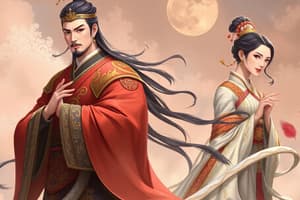Podcast
Questions and Answers
What was the impact of Confucius' teachings on the judicial system during the Han Dynasty?
What was the impact of Confucius' teachings on the judicial system during the Han Dynasty?
- Emphasized individual judgment over predetermined legal codes
- Encouraged adherence to societal norms and filial piety (correct)
- Led to a decrease in literacy rates among judges
- Promoted corruption and abuse within the court system
What differentiated the Han Empire from other dynasties in terms of justice?
What differentiated the Han Empire from other dynasties in terms of justice?
- Implemented measures against corruption and abuse (correct)
- Ignored societal norms when making legal decisions
- Did not have predetermined legal codes for court proceedings
- Relied solely on judges' personal judgment for cases
How were social ranks structured in the Han society?
How were social ranks structured in the Han society?
- Constantly changing without any structure
- Dependent solely on birthrights
- Loosely based on wealth, occupation, and personal qualities (correct)
- Strictly determined by bloodline alone
What was a significant aspect of women's rights during the Han Dynasty?
What was a significant aspect of women's rights during the Han Dynasty?
What were the principles that Classical Chinese societies emphasized during the Han Dynasty?
What were the principles that Classical Chinese societies emphasized during the Han Dynasty?
How did paper contribute to spreading knowledge during the Han Dynasty?
How did paper contribute to spreading knowledge during the Han Dynasty?
What was the moral foundation of the state during the Han Dynasty?
What was the moral foundation of the state during the Han Dynasty?
How did influential statesmen like Jia Yi and Zhang Liang contribute to the Han Dynasty reforms?
How did influential statesmen like Jia Yi and Zhang Liang contribute to the Han Dynasty reforms?
What technological advancement significantly improved farming productivity during the Han Dynasty?
What technological advancement significantly improved farming productivity during the Han Dynasty?
How did trade along the Silk Road impact the economy during the Han Dynasty?
How did trade along the Silk Road impact the economy during the Han Dynasty?
What aspects of education received considerable attention during the Han Dynasty?
What aspects of education received considerable attention during the Han Dynasty?
How did the imperial courts maintain stability among diverse ethnic groups during the Han Dynasty?
How did the imperial courts maintain stability among diverse ethnic groups during the Han Dynasty?
Flashcards are hidden until you start studying
Study Notes
Classical Chinese Society during the Han Dynasty
The Han Dynasty spanned from 206 BCE until 220 CE, ushering in an era of prosperity and cultural development in China. This period offers valuable insights into classical Chinese society through its advances in politics, economics, education, law, and social structure. Let's explore these aspects more closely.
Government and Politics
Han rulers established centralized governance, establishing Confucian values as the moral foundation of the state. Influential statesmen like Jia Yi and Zhang Liang advocated for reforms that led to improved taxation systems and bureaucratic efficiency. To maintain stability and peace among diverse ethnic groups, the imperial courts employed strategies such as marriage alliances between members of royal families, which strengthened political bonds.
Economy and Trade
Han Dynasty saw significant advancements in agricultural technology—iron tools replaced stone ones, improving farming productivity. As trade flourished along the Silk Road, merchants were given new opportunities to exchange goods with foreign nations, leading to economic growth. The government also played a role in promoting commerce by building roads, canals, and markets throughout the empire.
Education and Culture
During this time, education received considerable attention, providing students with access to philosophies, history, literature, poetry, painting, calligraphy, music, and dance. Scholars meticulously studied ancient texts like I Ching (Yijing) and Analects, seeking wisdom while refining their literary skills. Over time, schools became institutionalized under the sponsorship of local governments, encouraging widespread literacy among the populace. Additionally, the invention of paper around 105 AD greatly contributed toward spreading knowledge.
Law and Justice System
Confucius' teachings heavily influenced the judicial system; adherence to societal norms was encouraged, driven largely by traditional filial piety and reverence for ancestors. Judges relied upon predetermined legal codes when adjudicating cases, aiming to maintain objectivity and fairness within court proceedings. Unlike other dynasties, the Han Empire had some measures in place against corruption and abuse, making it one of the most progressive regimes in terms of justice.
Social Structure and Customs
Seven ranks governed the Han society, loosely based on wealth, occupation, and personal qualities rather than bloodline alone. Nobles held prestigious positions in the aristocracy due to birthrights, whereas commoners worked hard to climb up socially through meritocratic means. Despite rigid class distinctions, intermarriage between nobility and commoners occurred often enough to blur boundaries somewhat. Women enjoyed relatively equal rights compared to other periods because they could inherit property and take part in family affairs.
Classical Chinese societies achieved remarkable progress during the Han Dynasty by emphasizing virtue, learning, governance, and harmony. These principles continue to influence modern Chinese culture even today.
Studying That Suits You
Use AI to generate personalized quizzes and flashcards to suit your learning preferences.



